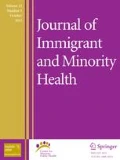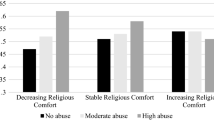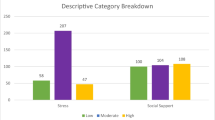Abstract
Post-immigration adaptation is characterized by chronic and acute acculturative stressors. Salivary cortisol is a commonly used hormonal marker of stress, but few studies have investigated its use as an indicator of acculturative stress and adjustment in immigrants. The purpose of this study was to examine relationships among predictors of adjustment (environmental and language mastery), self-reported stress outcomes (depressive symptoms, perceived stress, alienation), and salivary cortisol response in immigrants from the former Soviet Union. The sample included 137 married men and women aged 42–80 who lived in the U.S. for 1–13 years. Results indicated that while men and women had similar values for cortisol response, relationships among adjustment measures, stress outcomes, and cortisol differed by gender. Among men, environmental mastery significantly reduced depressive symptoms, perceived stress, and cortisol response. Among women, environmental mastery also reduced depressive symptoms, perceived stress, and alienation, but language mastery increased cortisol response and decreased alienation.

Similar content being viewed by others
References
Williams DR. Socioeconomic differentials in health: a review and redirection. Soc Psychol Q. 1990;53:81–99.
Hayward MD, Crimmins EM, Miles T, Yang Y. The significance of socio-economic status is explaining the race gap in chronic health conditions. Am Sociol Rev. 2000;65:910–30.
Crimmins EM, Seeman TE. Integrating biology into the study of health disparities. In: Waite LJ, editor. Aging, health, and public policy: demographic and economic perspectives, supplement to population and development review 2004;30.
Anderson KM, Catelli WP, Levy D. Cholesterol and mortality: 30 years of follow-up from the Framingham Study. J Am Med Assoc. 1987;257:2176–80.
Corti MC, Guralnik JM, Salvie ME, Harris T, Ferrucci L, et al. Clarifying the direct relation between total cholesterol levels and death from coronary heart disease in older persons. Ann Intern Med. 1997;126:753–60.
Volpato S, Leveille SG, Corti MC, Harris TB, Guralnik JM. The value of serum albumin and high-density lipoprotein cholesterol in defining mortality risk in older persons with low serum cholesterol. J Am Geriatr Soc. 2001;49:1142–7.
Seeman TE, McEwen BS, Singer B, Albert M, Rowe JW. Increase in urinary cortisol excretion and declines in memory: MacArthur studies of successful aging. J Clin Endocrinol Metab. 1997;82:2458–65.
Karlamangla A, Singer B, Reuben D, Seeman TE. Increase in serum non-high density lipoprotein cholesterol may be beneficial in some high-functioning older adults: MacArthur studies of successful aging. J Am Geriatr Soc. 2004;52:487–94.
Williams CL, Berry JW. Primary prevention of acculturative stress among refugees. Am Psychol. 1991;46:632–41.
Hazuda HP, Stern MP, Haffner SM. Acculturation and assimilation among Mexican Americans: scales and population-based data. Soc Sci Q. 1988;69:687–706.
Moyerman DR, Forman BD. Acculturation and adjustment: a meta-analytic study. Hisp J Behav Sci. 1992;14:163–200.
Choi G. Acculturative stress, social support and depression in Korean American families. J Fam Soc Work. 1997;2:81–97.
Hellhammer DK, Wüst S, Kudielka BM. Salivary cortisol as a biomarker in stress research. Pyschoneuroendocrinology. 2009;34:163–71.
Kirschbaum C, Wüst S, Hellhammer D. Consistent sex differences in cortisol responses to psychological stress. Psychosom Med. 1992;54:648–57.
Selye H. The physiology and pathology of exposure to stress: a treatise based on the concepts of the general-adaption-syndrome and the diseases of adaptation. Montreal: Acta, Inc.; 1950.
Teske RH, Nelson BH. Acculturation and assimilation: a clarification. Am Ethnol. 1974;1:351–67.
Negy C, Hammons ME, Reig-Ferrer A, Carper TM. The importance of addressing acculturative stress in marital therapy with Hispanic immigrant women. Int J Clin Health Psychol. 2010;10:5–21.
Tran T, Fitzpatrick T, Berg W, Wrights R. Acculturation, health, stress, and psychological distress among elderly Hispanics. J Cross Cult Gerontol. 1996;11:149–65.
Miller AM, Wang E, Szalacha L, Sorokin O. Longitudinal changes in acculturation for immigrant women from the former Soviet Union. J Cross Cult Psychol. 2009;40:400–15.
Rudmin FW. Constructs, measurements and models of acculturation and acculturative stress. Int J Intercult Relat. 2009;33:106–23.
Aichberger MC, Schouler-Ocak M, Mundt A, Busch M, Nickels E, Heimann H, Strohle A, et al. Depression in middle-aged and older first generation migrants in Europe: results from the survey of health, ageing, and retirement in Europe (SHARE). Eur Psychiatry. 2010;25:468–75.
Haasen C, Demiralay C, Reimer J. Acculturation and mental distress among Russian and Iranian migrants in Germany. Eur Psychiatry. 2008;23:510–3.
Berry JW, Kim U, Power S, Younger M, Bujaki M. Acculturation attitudes in plural societies. Appl Psychol: Int Rev. 1989;38:185–206.
Kim S, Rew L. Ethnic identity, role integration, quality of life and depression in Korean-American women. Arch Psychiatr Nurs. 1994;8:348–56.
Schwartz SJ, Pantin H, Sullivan S, Pardo G, Szapocznik J. Nativity and years in the receiving culture as markers of acculturation in ethnic enclaves. J Cross Cult Psychol. 2006;37:345–53.
Stevens G. Age at immigration and second language proficiency among foreign-born adults. Lang Soc. 1999;28:555–78.
Angel RJ, Agel JL, Lee GY, Markides KS. Age at migration and family dependency among older Mexican immigrants: recent evidence from the Mexican American EPESE. The Gerontologist. 1999;39:59–65.
Pratt LA, Brody DJ. Depression in the United States Household Population, 2005–2006. NCHS Data Briefs. 2008;7:1–8.
Zunzunegui M, Minicuci N, Blumstein T, Noale M, Deeg D, Jylhä M, Pedersen N. Gender differences in depressive symptoms among older adults: a cross-national comparison. Soc Psychiatry Psychiatr Epidemiol. 2007;42(3):198–207.
Ritsner M, Ponizovsky A, Nechamkin Y, Modai I. Gender differences in psychosocial risk factors for psychological distress among immigrants. Compr Psychiatry. 2001;42(2):151–60.
Lai D, Surood S. Predictors of depression in aging South Asian Canadians. J Cross Cult Gerontol. 2008;23(1):57–75.
Miller AM, Gross R. Depression and health of women from the former Soviet Union living in the United States and Israel. J Immigr Health. 2004;6:183–92.
Salgado de Snyder N, Cervantes RC, Padilla AM. Gender and ethnic differences in psychosocial stress and generalized distress among Hispanics. Sex Roles. 1990;22(7/8):441–53.
Bhattacharya G. Global contexts, social capital, and acculturative stress: experiences of Indian immigrant men in New York City. J Immigr Minor Health. 2011;13:756–65.
Miller AM, Birman D, Zenk S, Wang E, Sorokin O, Connor J. Neighborhood immigrant concentration, acculturation, and cultural alienation in former Soviet immigrant women. J Commun Psychol. 2009;37:88–105.
Sam D, Berry J, editors. The Cambridge Handbook of Acculturation Psychology. London: Cambridge University Press; 2005.
Aroian KJ, Schappler-Morris N, Neary S, Spitzer A, Tran TV. Psychometric evaluation of the Russian language version of the resilience scale. J Nurs Meas. 1997;5:151–64.
Union of Councils for Soviet Jews: Jewish emigration from the former Soviet Union: 1954–1997; 2002. Retrieved September 5, 2003, from http://www.us-israel.org/jsource/Judaism/fsuemig.html.
U.S. Immigration and Naturalization, Service: Statistical Yearbook of the Immigration and Naturalization Service, 1999. Retrieved September 5, 2003, from http://www.immigration.gov/graphics/shared/aboutus/statistics/imm99list.htm.
Miller AM, Sorokin O, Wang E, Choi M, Feetham S, Wilbur J. Acculturation, social alienation, and depressed mood in midlife women from the former Soviet Union. Res Nurs Health. 2006;29:134–46.
Miller AM, Chandler PJ. Acculturation, resilience, and depression in midlife women from the former Soviet Union. Nurs Res. 2002;51:26–32.
Ritsner M, Ponizovsky A, Nechamkin Y, Modai I. Gender differences in psychosocial risk factors for psychological distress among immigrants. Compr Psychiatry. 2001;42:151–60.
Aroian KJ, Norris AE, Chiang L. Gender differences in psychological distress among immigrants from the former Soviet Union. Sex Roles. 2003;48:39–51.
Kirschbaum C, Hellhammer DH. Salivary cortisol in psychobiological research: an overview. Neuropsychobiology. 1989;22:150–69.
Adam EK, Kumari M. Assessing salivary cortisol in large-scale epidemiological research. Psychoneuroendocrinology. 2009;34:1423–36.
Agbedia O, Varma VR, Seplaki C, Seeman TE, Fried LP, Li L, Harris GC, et al. Blunted diurnal decline of cortisol among older adults with low socioeconomic status. Ann N Y Acad Sci. 2011;1231:56–64.
Kunz-Ebrecht S, Kirschbaum C, Marmot M, Steptoe A. Differences in cortisol awakening response on work days and weekends in women and men from the Whitehall II cohort. Psychoneuroendocrinology. 2004;29:516–28.
Chida Y, Steptoe A. Cortisol awakening response and psychosocial factors: a systematic review and meta-analysis. Biol Psychol. 2009;80:265–78.
Clow A, Thorn L, Evans P, Hucklebridge F. The awakening cortisol response: methodological issues and significance. Stress. 2004;7:29–37.
Gallagher-Thompson D, Shurgot G, Rider K, Gray H, McKibbin C, Kraemer H, Sephton S, Thompson L. Ethnicity, stress, and cortisol function in Hispanic and non-Hispanic White women: a preliminary study of family dementia caregivers and noncaregivers. Am J Geriatric Psychiatry. 2006;14:334–42.
Korenblum W, Barthel A, Licinio J, Wong M-L, Wolf OT, Kirschbaum C, Bornstein SR. Elevated cortisol levels and increased rates of diabetes and mood symptoms in Soviet Union-born Jewish immigrants to Germany. Mol Psychiatry. 2005;10:974–5.
Li L, Power C, Kelly S, Kirschbaum C, Hertzman C. Life-time socio-economic position and cortisol patterns in mid-life. Psychoneuroendocrinology. 2007;32:824–33.
Matheson K, Jordan S, Anisman H. Relations between trauma experiences and psychological, physical and neuroendocrine functioning among Somali refugees: mediating role of coping with acculturation stressors. J Immigr Minor Health. 2008;10:291–304.
Freidenberg B, Gusmano R, Hickling E, Blanchard E, Bremner JD, Frye C. Women with PTSD have lower basal salivary cortisol levels later in the day than do men with PTSD: a preliminary study. Physiol Behav. 2009;99:234–6.
Rohleder N, Joksimovic L, Wolf J, Kirschbaum C. Hypocortisolism and increased glucocorticoid sensitivity of pro-inflammatory cytokine production in Bosnian war refugees with posttraumatic stress disorder. Biol Psychiatry. 2004;55:745–51.
Mangold D, Wand G, Javors M, Mintz J. Acculturation, childhood trauma and the cortisol awakening response in Mexican-American adults. Horm Behav. 2010;58:637–46.
Mangold D, Marino E, Javors M. The cortisol awakening response predicts subclinical depressive symptomatology in Mexican American adults. J Psychiatr Res. 2011;45:902–9.
Kudielka B, Hellhammer DH, Wust S. Why do we respond so differently? Reviewing determinants of human salivary cortisol responses to challenge. Psychoneuroendocrinology. 2009;34:2–18.
Van Cauter E, Leproult R, Kupfer DJ. Effects of gender and age on the levels and circadian rhythmicity of plasma cortisol. J Clin Endocrinol Metab. 1996;81:2468–73.
Kirschbaum C, Klauer T, Filipp S-H, Hellhammer DH. Sex-specific effects of social support on cortisol and subjective responses to acute psychological stress. Psychosom Med. 1995;57:23–31.
Stroud LR, Salovey P, Epel ES. Sex differences in stress responses: social rejection versus achievement stress. Biol Psychiatry. 2002;52:318–27.
Kudielka B, Hellhammer DH. Sex differences in HPA axis responses to stress: a review. Biol Psychol. 2005;69:113–32.
Seeman T, Singer B, Wilkinson C, McEwen B. Gender differences in age-related changes in HPA axis reactivity. Psychoneuroendocrinology. 2001;26:225–40.
Weekes N, Lewis R, Goto S, Garrison-Jakel J, Patel F, Lupien S. The effect of an environmental stressor on gender differences on the awakening cortisol response. Psychoneuroendocrinology. 2008;33:766–72.
Gunnar M, Vazquez D. Low cortisol and a flattening of expected daytime rhythm: potential indices of risk in human development. Dev Psychopathol. 2001;13:515–38.
Steptoe A, Kunz-Ebrecht S, Owen N, Feldman P, Willemsen G, Kirschbaum C, Marmot M. Socioeconomic status and stress-related biological responses over the working day. Psychosom Med. 2003;65:461–70.
Baron J, Comi R, Cryns V, Brinck Johnson T, Mercer NG. The effect of cigarette smoking on adrenal cortical hormones. J Pharmacol Exp Ther. 1995;272:151–5.
Steptoe A, Ussher M. Smoking, cortisol and nicotine. Int J Psychophysiol. 2006;59:228–35.
Knight J, Avery E, Janssen I, Powell L. Cortisol and depressive symptoms in a population-based cohort of midlife women. Psychosom Med. 2010;72:855–61.
Sher L. Daily hassles, cortisol, and the pathogenesis of depression. Med Hypotheses. 2004;62:198–202.
Garyfallos G, Karastergiou A, Adamopoulou A, Moutzoukis C, Alagiozidou E, Mala D, et al. Greek version of the general health questionnaire: accuracy of translation and validity. Acta Psychiatr Scand. 1991;84:371–8.
Harkness JA, Schoua-Glusberg AS. Questionnaires in translation. ZUMA-Nachrichten; 1998 Spezial January: 87–127.
Davis RE, Resnicow K, Couper M. Survey response styles, acculturation, and culture among a sample of Mexican American adults. J Cross Cult Psychol. 2011;42:1219–36.
Ryff CD. Happiness is everything, or is it? Explorations on the meaning of psychological well-being. J Pers Soc Psychol. 1989;57:1069–81.
Radloff LS. The CES-D Scale: a self-report depression scale for research in the general population. Appl Psychol Meas. 1977;1:385–401.
Cohen S, Kamarck T, Mermelstein R. A global measure of perceived stress. J Health Soc Behav. 1983;24:385–96.
Nicassio PM. Psychosocial correlates of alienation: study of a sample of Indochinese refugees. J Cross Cult Psychol. 1993;14:337–51.
Phinney J, Horenczyk G, Liebkind K, Vedder P. Ethnic identity, immigration, and well-being: an interactional perspective. J Soc Issues. 2001;57:493–510.
Tran TV. Sex differences in English language acculturation and learning strategies among Vietnamese adults aged 40 and over in the United States. Sex Roles. 1988;19:747–58.
Oh Y, Koeske GF, Sales E. Acculturation, stress, and depressive symptoms among Korean immigrants in the United States. J Soc Psychol. 2002;142(4):511–26.
Gellis ZD. Kin and nonkin social supports in a community sample of Vietnamese immigrants. Soc Work. 2003;48(2):248–58.
Kessler RC. Epidemiology of women and depression. J Affect Disord. 2003;74:5–13.
Wüst S, Wolf J, Hellhammer D, Federenko I, Schommer N, Kirschbaum C. The cortisol awakening response—normal values and confounds. Noise Health. 2009;7:79–88.
Pruessner M, Hellhammer DH, Pruessner JC, Lupien SJ. Self-Reported depressive symptoms and stress levels in healthy young men: associations with the cortisol response to awakening. Psychosom Med. 2003;65:92–9.
Semmer NK, Grebner S, Elfering A. Beyond self-report: using observational, physiological, and situation-based measures in research on occupational stress. In: Perrewe PL, Ganster DC, editors. Emotional and physiological processes and positive intervention strategies (research in occupational stress and well-being, volume 3). Cambridge: Emerald Group Publishing; 2003. p. 205–63.
Phinney JS, Flores J. ‘‘Unpackaging’’ acculturation: aspects of acculturation as predictors of traditional sex role attitudes. J Cross Cult Psychol. 2002;33:320–31.
Masood N, Okazaki S, Takeuchi DT. Gender, family and community correlates of mental health in South Asian Americans. Cult Divers Ethnic Minor Psychol. 2009;15:365–74.
Hellhammer J, Fries E, Schweisthal OW, Schlotz W, Stone AA, Hagemann D. Several daily measurements are necessary to reliably assess the cortisol rise after awakening: state and trait components. Psychoneuroendocrinology. 2007;32:80–6.
Choi J, Miller AM, Wilbur J. Acculturation and depressive symptoms in Korean immigrant women. J Immigr Minor Health. 2009;11:13–9.
Acknowledgments
This study was funded by a grant from the National Institute of Child Health and Human Development (NICHD), National Institutes of Health, # R01 HD38101. We would like to thank Edward Wang, PhD, for his early feedback on statistical analyses for this manuscript.
Author information
Authors and Affiliations
Corresponding author
Rights and permissions
About this article
Cite this article
Nicholson, L.M., Miller, A.M., Schwertz, D. et al. Gender Differences in Acculturation, Stress, and Salivary Cortisol Response Among Former Soviet Immigrants. J Immigrant Minority Health 15, 540–552 (2013). https://doi.org/10.1007/s10903-012-9752-x
Published:
Issue Date:
DOI: https://doi.org/10.1007/s10903-012-9752-x




